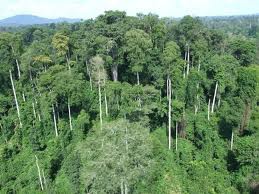Regional News of Thursday, 14 August 2014
Source: GNA
Forest Commission initiates key reforms

The Forestry Commission (FC) has initiated key policy reforms to effectively respond to environmental safety and boost forest carbon stock.
Forest management strategies highlight the critical importance of reducing emissions from deforestation and forest degradation.
Mr Samuel Afari Dartey, the Commission’s Chief Executive, addressing a workshop at Fumesua in the Ejisu-Juaben Municipality, said it was no accident that the Forest and Wildlife Policy (2012), for example incorporated “Reducing Emissions from Deforestation and Forest Degradation (REDD+)” in forest governance.
REDD+ mechanism is the international community’s recognition of the climate-regulating role of forests and trees.
The goal is to slow down the destruction of tropical forests, enhance conservation, their sustainable management and forest carbon stock.
The workshop provided the platform to discuss the findings of a pilot research study on the implementation of the REDD+ in off-forest reserves.
The study was conducted a group of researchers from the Forestry Research Institute of Ghana (FORIG) together with the FC, Kwame Nkrumah University of Science and Technology (KNUST) and Bern University of Applied Sciences/School of Agriculture in Germany.
It was undertaken in six communities in three districts - Aowin-Suaman, Asikuma-Odoben-Brakwa and Kintampo North Municipality and sought to identify strategies that simultaneously reverse agriculture’s adverse effects on forests and trees and hence carbon emissions.
Mr Dartey said a lot of work had been done to make REDD+ a key component of the country’s climate change mitigation and adaptation strategy.
“Ghana’s REDD+ readiness process is nearing completion and a REDD+ package that would outline Ghana’s strategy and framework for safeguards, among others, would be completed by 2015.”
Mr Kwame Antwi Oduro, a member of the project coordinating team, presenting their findings said farmers in some of the communities accepted to help plant more trees on their farm lands to save the environment.
The farmers affirmed that it would be helpful - agreed that not only would the project help to increase people’s income but also reduce net greenhouse gas emission from agricultural and forestry practices.
Madam Brigitte Cuendet, Counselor, Head of Co-operation Swiss Embassy, said, it was heartwarming that the people were appreciating the need to replace trees cut.
“It is a move in the right direction to correct the wrongs in the system”, she added.
Mr Tabi Agyarko of the Ministry of Lands and Natural Resources announced that $55 million had been earmarked by the World Bank to help ease pressure on natural resources, engage local communities in REDD? and engage the private sector to install plants or machines that significantly reduce waste.
Dr Victor Agyemang, Director of FORIG, said Africa’s forest degradation rate was high and that efforts must be stepped up to stop the destruction.










